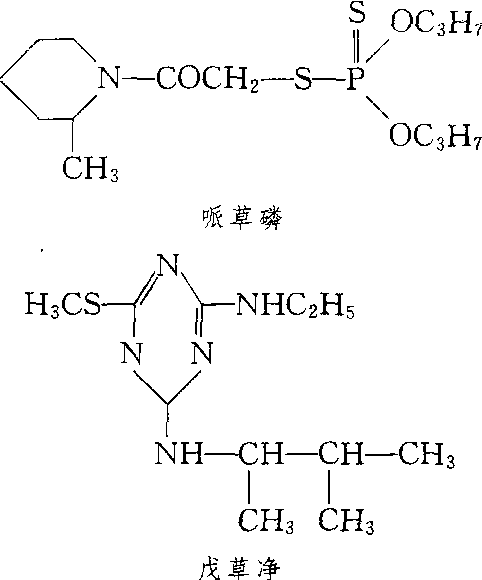威罗生piperophos and dimethametryn
又称排草净、净哌磷混剂。稻田广谱选择性复配除草剂。由哌草磷和戊草净复配而成。哌草磷的化学名称为S-2-甲基哌啶基羰基甲基-O,O-二丙基二硫代磷酸酯,戊草净的化学名称为2-(1,2-二甲基丙胺基)-4-乙胺基-6-甲硫基-1,3,5-三氮苯。化学结构式分别如下。哌草磷原药黄至棕色液体,纯品密度1.1(20℃),蒸气压32×10-6 Pa,沸腾前分解,闪点62℃。几乎不溶于水,溶于大多数有机溶剂。戊草净原药为含有部分结晶的棕色胶黏液,纯品熔点65℃,20℃时蒸气压为186.7×10-6 Pa,密度1.098(20℃),沸点151 ~153℃(66.7 Pa),微溶于水,溶于大多数有机溶剂。威罗生中哌草磷与戊草净配比为4:1,适于水稻田使用。哌草磷可经根、子叶及胚芽进入植物体内,抑制核酸及蛋白质合成;戊草净通过根和叶吸收进入体内,破坏光合作用,使杂草饥饿死亡。可防除稻田稗草、片毛草、异型莎草、鸭舌草、节节草、萤蔺等多种一年生和多年生单、双子叶杂草。水稻移栽后,一年生杂草3叶期内、莎草出齐时用药。戊草净大鼠急性口服LD50为3 000 mg/kg,急性经皮LD50>2 150 mg/kg;哌草磷大鼠急性口服LD50为324 mg/kg,急性经皮LD50> 2 150mg/kg,急性吸入LC50>1.96 mg/L。50%威罗生乳油对大鼠急性口服LD50为940 mg/kg,急性经皮LD50>2 150 mg/kg,急性吸入LC50>1.83 mg/m3。
